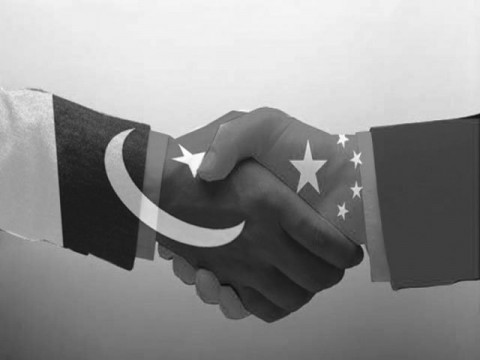By Jayadeva Ranade
 |
China’s expanded influence in Pakistan came into prominence recently amidst the fog of verbiage surrounding the Memogate fiasco. The shorthand used for years to describe Pakistan’s political power triad namely, ‘Allah, Army and America’, now has to include China.
Over the past few years and, especially since the US raid in May 2011 to eliminate Osama bin Laden, China’s proximity to Pakistan has increasingly been on display. Examples include Sino-Pak collaboration to stall the Indo-US Civil Nuclear Agreement, prevent the Nuclear Suppliers Group granting a waiver to India and opposition to India becoming a Permanent Member of the UN Security Council.
As US-Pak relations came under strain in the wake of the raid, China shed its preference for exercising influence from behind-the-scenes and in mid-May, it publicly expressed support for Pakistan. It declared in unequivocal terms that any attack on Pakistan would be construed as an attack on China. Pakistan’s media added that this warning had been conveyed by the Chinese Foreign Minister during that week’s ‘China-US Strategic and Economic Dialogue’ in Washington. Pakistan Premier Yousuf Gilani flew to Beijing to garner support and was promptly received by Chinese Premier Wen Jiabao.Support was reaffirmed late in November when US-Pak relations were subjected to further protracted strain following the death of Pak military personnel in drone attacks. US was asked to vacate Shamsi air base near Abbotabad at the insistence of Pakistan’s Army Chief. Beijing, which had been trying to incrementally surpass US influence in Pakistan, had clearly sighted an opportunity to consolidate its position in Pakistan and secure a permanent niche in the subcontinent. Pakistan’s drift away from the US actually began when General Zia-ul-Haq, during his 11-year regime after seizing power in a military coup in July 1977, initiated a fundamental pro-Islam shift in the Army.
China already has substantial influence within Pakistan’s political and bureaucratic apparatus. This was evident when at least two former Pakistani Ambassadors, one of whom was a Foreign Secretary, wrote in national Pakistani dailies urging the government to terminate the contract awarded to the Singapore Port Authority for management of Gwadar port and hand it over to the Chinese. Senior Pakistani politicians also frequently visit China especially during tense times, though they balance relationships with equally high level visits to the US.
Beijing, however, focused on cultivating Pakistan’s military establishment and used military diplomacy to expand influence.
The likelihood of Islamic fundamentalism spilling over into Xinjiang is also a concern. An official Xinhua commentary last September warned : ‘If violent forces in Xinjiang gain ground, China may be forced to directly intervene militarily in Pakistan and Afghanistan, but this is clearly not the situation China would like to see’.
In addition to ongoing nuclear cooperation, since 2004, Pakistan Army officers attend 18-20 courses each year at thirteen Chinese military institutes. At least 170 Pak Army officers have been trained and, in contrast, today there are only 116 officers who have been trained in the US. China is also the largest supplier of military equipment to Pakistan and its military assistance, which has increased each year, was last year estimated at approximately US$ 84 million. This is less than the US$ 500 million promised by the US to Islamabad for the five year period 2009-13, but is compensated by China’s diplomatic support and clandestine supplies of military technology to Pakistan.
Additional evidence of Beijing’s proximity is provided by Chinese Special Envoy Dai Bingguo visiting Islamabad on December 24, soon after the US warned Kayani against ousting the civilian government, and asserting China’s support for Pakistan’s independence, sovereignty, and territorial integrity. Shortly thereafter on January 4, General Kayani traveled to China. His visit comes at a critical time in US-Pak relations and during a stand-off between the Army and Pakistan’s civilian government.
China’s steadily expanding influence in Pakistan, especially in the Army, has consequences for India and US. Popular resentment against the US is increasing. It is accompanied by enhanced Chinese military presence in Pakistan’s northern areas and plans for construction of strategic rail and road links between China’s Xinjiang and Gwadar in Baluchistan. Beijing has also stepped up diplomatic and other support to Islamabad, especially in Pakistan’s posture towards India. Chinese pressure on India, including depiction of J&K as disputed, should be viewed in this context.
The author is a former Additional Secretary in the Cabinet Secretariat, Government of India.
Source : DNA




